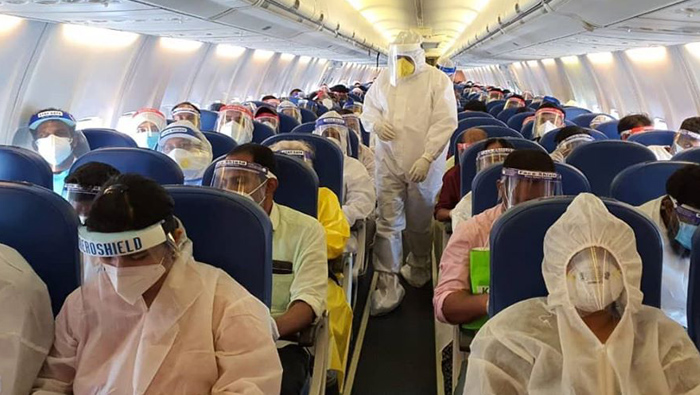
Muscat: Passengers arriving in Oman must have insurance that will cover the costs for at least 30 days of COVID-19 treatment, the country’s Civil Aviation Authority has said.
The guidelines were issued by the CAA ahead of the planned reopening of airports in the country, which has been scheduled for 1 October. All passengers are required to follow them to minimise the spread of the disease.
Speaking to Times of Oman, an official from Oman Airports said: “These precautionary measures at Oman’s airports were previously applied for unscheduled flights. Starting 1 October, they will be in place across all scheduled flights.”
One month cost coverage
“All incoming passengers must have health insurance that covers the cost of their care for a period of up to one month,” said the government authority. “The temperature of all arrivals will be checked, and those who display the symptoms of the coronavirus will be subject to further examination.
“Transfer passengers must abide by the guidelines issued, both while on board and at the airport,” they added. “Incoming passengers must submit all documents required of them, as well as follow the requests made of them by the authorities, which could include taking a medical examination or entering quarantine.
“Physical distancing must be maintained in all areas in the airport, and all those who enter the country are required to register on the Tarassud Plus COVID monitoring app prior to their arrival,” added the CAA.
Currently, non-Omanis are not allowed to enter the Sultanate, without a travel permit issued by the Ministry of Foreign Affairs, based on applications put forward by their sponsors, or the country’s national carriers, Oman Air and SalamAir. Only these two airlines can currently carry transfer passengers.
All arrivals into the country will also be subject to PCR tests, the results of which could take between one and seven days, and must enter 14-day quarantine, during which period they must wear an electronic wristband to monitor their whereabouts.
“Foreign nationals coming to the Sultanate must show confirmation of reserved accommodation, and pay for their 14-day stay in institutional quarantine,” the Civil Aviation Authority said, adding that aircrew are currently exempt from institutional quarantine, but must follow the guidelines issued for cabin crew by the Ministry of Health, while foreign diplomats can undergo home quarantine for the aforementioned period.
People are not allowed to wait in the arrivals area of the airport to receive passengers, unless they have been given authorisation to do so. As part of its guidelines, the CAA also recommended that all passengers arriving to and leaving Oman complete whatever procedures they could before coming to the airport.
“Please comply with the regulations, checks and procedures in force in the country of destination,” said the CAA. “It is preferred that passengers complete their pre-travel checks electronically, and also fill out the electronic health declaration form which says you are free of COVID-19 and its symptoms.”
Passengers are only allowed to bring one handbag and one duty free bag each, during their time inside the airport, to avoid congestion at security checkpoints. It is also to be noted that while those who plan to travel have to be at the airport at least three and a maximum of four hours before departure, they will not be allowed to enter, should they display any of the COVID symptoms listed by the Ministry of Health.
“All travellers must adhere to wearing masks in the correct manner upon arrival at the airport and for the duration of the flight,” added the CAA. “Non-travellers, those who drop passengers to the airport, and members of the public are not allowed to enter the departures building, with the exception of an escort for people with special needs.
“Omanis in the country who wish to travel overseas must have health insurance that provides coverage for COVID-19, and all travellers will be bound by the rules of their destination country. Nationals and residents can leave the country without the issuance of a travel permit.”
The guidelines include steps to be followed both inside the airport and on board the aircraft. These include agreeing to temperature checks, agreeing to enter quarantine if needed, and to inform a doctor of any symptoms of COVID-19 passengers might have, should they experience them.
People within the airport have to commit to social distancing protocols, and follow the instructions listed on floor stickers and wall signs. “Make sure you regularly visit the toilets to wash your hands with soap and water, and ensure you sterilise your hands after exchanging documents with the concerned persons,” added the organisation.
“Sterilisers are available in all airport areas. Passengers must agree to take off their masks whenever asked by police officers, whether at passport desks, at security checkpoints, or anywhere in the airport.
“Payment by electronic means is advised, as is the use of self-service areas where available,” said the advisory. “Avoid close queuing at all stages of travel, in boarding areas, and inside the plane, and do follow physical distancing requirements. When disposing of face masks and gloves, throw them in the appropriate areas.”
All passengers must stay in their seat and wear their face masks throughout their flight, unless it is absolutely necessary to do so otherwise.